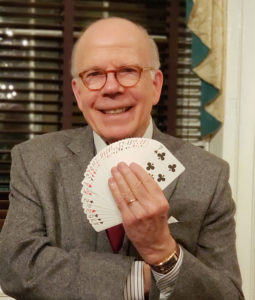Thursday, July 29, 2021
John McLaughlin
When the pandemic went into high gear, I was halfway through teaching a graduate seminar on American intelligence and foreign policy at the Johns Hopkins School of Advanced International Studies (SAIS) in Washington. Overnight, faculty members and students had to figure out how to continue our courses online, with everyone stuck in place wherever they were. This involved crash courses on video programs like Zoom, Panopto, Microsoft Teams, WebEx, Skype – anything that would allow us to stay connected and move forward. And magic inevitably played a role – more below.
 I came to admire the maturity and resilience of these students as we convened for several hours during each week in class and in one-on-one office hour sessions. They were scattered all across America and around the world, showing up on my computer screen from California, Korea, Budapest and beyond. I also came to realize that, even though everyone preferred a three-dimensional live classroom, there is a unique kind of intimacy that comes from having a face and voice in full-screen just a few inches away, something that in a classroom, would lead you to feel like you were invading each other’s’ “space”.
I came to admire the maturity and resilience of these students as we convened for several hours during each week in class and in one-on-one office hour sessions. They were scattered all across America and around the world, showing up on my computer screen from California, Korea, Budapest and beyond. I also came to realize that, even though everyone preferred a three-dimensional live classroom, there is a unique kind of intimacy that comes from having a face and voice in full-screen just a few inches away, something that in a classroom, would lead you to feel like you were invading each other’s’ “space”.
Magic came into this in unique ways. I have always used magic to illustrate points I was trying to make in class about the need to question things, to be skeptical, to not trust first impressions. But in the Zoom environment, as with our Washington Magic online shows, my examples had to be quick, highly visual, and up high on the screen. Magic also helped combat something everyone discovered during the last year – Zoom fatigue. Studies have shown that people need a break or change of pace after about 10-15 minutes of Zoom, and magic did this – students could sense when it was coming, and it helped to keep attention and focus high.
As for magic itself, a year of pandemic led me to realize even more clearly that magic is a deep art that is really about the human condition. When a magician restores a torn newspaper, a cut rope, or broken thread, it spoke to the need students, and all of us, felt last year for connection and healing. When an illusion brings a smile, it lightens an atmosphere that often felt ominous during the last year.
One of the fun things that happened to me was getting a call in October from David Copperfield, considered by many to be today’s greatest magician. The Naval Institute had asked David to give a talk to Annapolis Cadets on the relationship between magic and war. And he asked if I would like to do it with him, and in two days we cobbled together a Zoom program that you can see here.
Looking forward to seeing you in 3-D soon at the Arts Club of Washington!
John McLaughlin